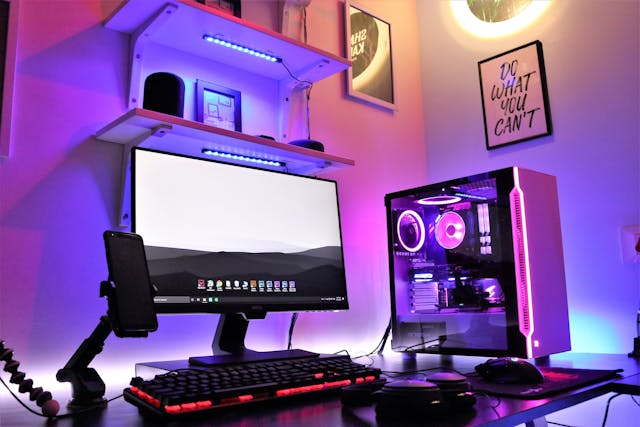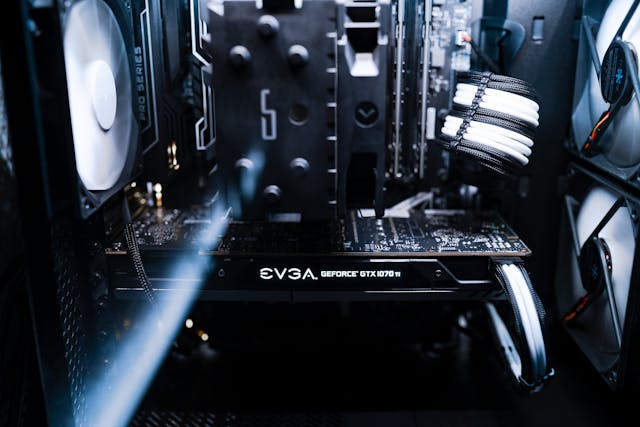Gaming Hardware: How to Build or Buy the Perfect Gaming PC
In the world of gaming, your hardware plays a critical role in performance. Whether you’re aiming for immersive graphics, ultra-smooth gameplay, or the ability to run the latest games on high settings, choosing the right components is essential. This guide will help you decide whether to build or buy the perfect gaming PC, and provide you with key tips on selecting the right hardware for your needs.

Building a Gaming PC: The Benefits
Why Build When You Can Buy?
Building your own gaming PC might seem intimidating at first, but it comes with several key advantages:
-
Customization: When you build your own PC, you get to choose every single component based on your personal preferences. Want the fastest processor? The most powerful graphics card? You’re in complete control of the specifications.
-
Better Performance for the Price: By hand-picking the components, you can often get better performance for your budget compared to pre-built systems. You can focus on the parts that matter most for gaming, like the GPU (graphics card), while saving on less critical components.
-
Learning Experience: Building a gaming PC can be a rewarding project that helps you understand how the different components work together. Plus, it gives you the knowledge needed for future upgrades or troubleshooting.
Key Components for a Gaming PC
Whether you’re building or buying, there are key components that make up any gaming rig. Here’s a breakdown of the most important parts and what to look for:
CPU (Central Processing Unit): The Brain of the PC
The CPU is responsible for handling most of the processing tasks. For gaming, you need a CPU that’s fast and capable of handling multiple processes simultaneously. Popular gaming CPUs are from Intel and AMD.
-
Intel: Known for high single-core performance, making them great for games that depend on fast processing speeds.
-
AMD: Offers great multi-core performance, ideal for games that are optimized for multiple threads.
GPU (Graphics Processing Unit): The Heart of Gaming Performance
The GPU is by far the most important component for a gaming PC. It determines how well your PC will handle graphics-intensive games. You’ll need a GPU that can handle 1080p, 1440p, or even 4K gaming, depending on your monitor.
-
NVIDIA and AMD are the two big players in the GPU market, with the NVIDIA GeForce RTX series and AMD Radeon RX series being the most popular among gamers.
RAM (Random Access Memory): Multitasking Made Easy
RAM is essential for smooth gameplay and multitasking. For gaming, 16GB of RAM is usually sufficient for most modern titles. However, if you plan to stream or run demanding programs simultaneously, 32GB could be beneficial.
-
DDR4 is the most common RAM type, with speeds ranging from 2400MHz to 4000MHz. Higher speed RAM can improve performance, but the difference is often subtle.
Storage: Speed and Capacity Matter
For fast loading times, Solid-State Drives (SSDs) are the way to go. A 1TB SSD can provide enough space for most games, ensuring quick boot times and fast load screens. If you need more storage, you can combine an SSD with a larger HDD (Hard Disk Drive) for games and other large files.
Motherboard: The Backbone of Your System
The motherboard connects all your components. It’s important to choose one that supports your CPU and other hardware. There are different form factors to consider (like ATX, Micro-ATX, and Mini-ITX), and you’ll want to ensure your motherboard has enough ports for USB devices, audio, and networking.
-
Ensure it has the appropriate socket for your CPU and supports the RAM speed and amount you want.
Cooling System: Keep Your PC Cool
Gaming generates heat, and keeping your components cool is essential for maintaining performance and longevity. Most CPUs and GPUs come with stock coolers, but you might want to upgrade to better air or liquid cooling solutions if you plan to overclock or if you’re building a high-performance system.
-
Air cooling: Popular and effective, with large fans and heat sinks to dissipate heat.
-
Liquid cooling: More expensive but can offer superior cooling for high-end builds.
Buying a Pre-Built Gaming PC: The Convenience Option
When You Want to Skip the Hassle
Building a gaming PC isn’t for everyone. If you don’t have the time, experience, or desire to assemble your own machine, buying a pre-built gaming PC is a great option. Here's why it might be the better choice for you:
-
Convenience: Pre-built systems come fully assembled, tested, and ready to use right out of the box. No need to worry about compatibility issues or the complexities of installation.
-
Warranty and Support: Many pre-built gaming PCs come with manufacturer warranties, meaning that if something breaks, you can rely on professional support to fix it.
-
Expertly Tuned Systems: Some companies, like Alienware, Corsair, and HP Omen, specialize in gaming PCs and offer systems that are optimized for high-performance gaming. These systems are designed to handle modern titles and demanding performance with ease.
What to Look for in a Pre-Built Gaming PC
If you decide to go the pre-built route, it’s important to choose the right system. Here are some things to keep in mind when shopping:
- GPU: Ensure the PC is equipped with a high-quality GPU, as it’s the most important factor in gaming performance. Look for NVIDIA’s RTX series or AMD’s Radeon RX series.
- CPU: Look for a multi-core CPU from either Intel or AMD with a fast clock speed. Intel’s Core i7 or AMD’s Ryzen 7 are great mid-range options.
- Storage: Look for a system that includes an SSD for faster load times, ideally with at least 1TB of storage space. Some systems also come with additional HDD storage for games and files.
- RAM: Aim for at least 16GB of RAM. 32GB is ideal for more demanding games or multitasking while streaming.
- Cooling: Make sure the system has adequate cooling, especially if you’re opting for a high-end build. Many gaming PCs come with liquid cooling for better heat dissipation.
- Upgradeability: Even if you’re buying a pre-built system, check if the PC allows for future upgrades. This is crucial if you want to enhance the performance of your rig down the line.

Which Is Right for You: Build or Buy?
Factors to Consider
-
Customization vs. Convenience: If you enjoy the process of selecting every part and assembling the PC yourself, building is the way to go. But if you want something that works right away, without any hassle, a pre-built system is your best option.
-
Budget: Building your own PC can often provide better performance for your budget, but pre-built systems offer convenience that might justify a slightly higher price.
-
Future Upgrades: If you’re planning to upgrade your PC over time, building it yourself allows you to replace individual components as needed. Pre-built systems may offer some upgradeability, but they might be more restrictive.
Final Thoughts
Whether you decide to build or buy a gaming PC, the right hardware will ensure that you can enjoy the latest games with smooth, high-quality performance. Building your own system can be a rewarding project, giving you the freedom to choose the best components for your needs. On the other hand, buying a pre-built gaming PC offers convenience, ease of setup, and professional support. Consider your preferences, skills, and budget to make the best decision for your gaming setup!












